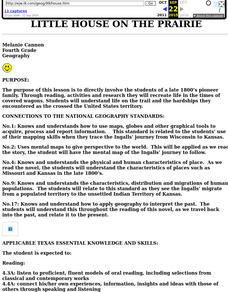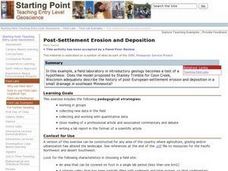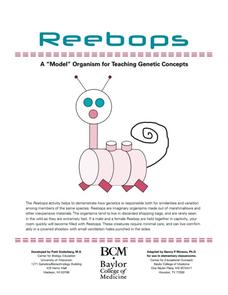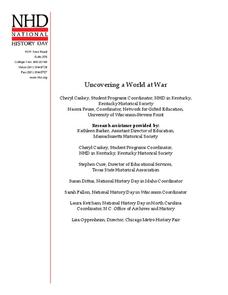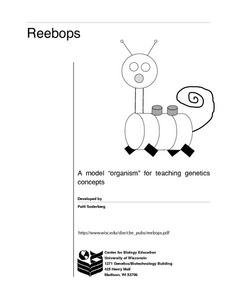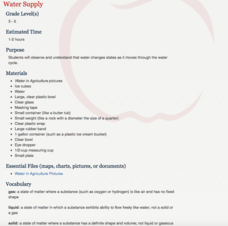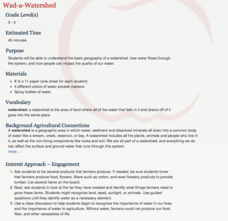Curated OER
Culture Challenge
Young scholars identify and classify characteristics of the four pre-European cultures in Wisconsin. They playing a game about the different characteristics that belong to each of the cultures studied.
Curated OER
Temperature Control - South African Roofing Materials
Students explore how different roofing materials can have an impact on the temperature inside a house through box houses. They compare/contrast different materials in Wisconsin and South Africa. In groups, they build a box house (shoe...
Curated OER
Little House On The Prarie
Fourth graders focus on the family's journey from Wisconsin to Kansas and their life there among the Indians.
Curated OER
Post-settlement landscape evolution
Pupils use this example, a field laboratory in introductory geology becomes a test of a hypothesis: Does the model proposed by Stanley Trimble for Coon Creek, Wisconsin adequately describe the history of post-European-settlement erosion...
Curated OER
Women in United States History
Students identify and explain the significance of key terms, such as: 19th Amendment, Femisnism, Flappers, Immigration and Jobs in Wisconsin. They identify and analyze viewpoints, events, social classes, and people of various years.
Curated OER
Food Needs, Food Wants
Students explore wants and needs. In this family budgeting lesson, students play the Food Money game to help them distinguish between food wants and needs. Students discuss their impressions of the game and food budgets.
Curated OER
Why Plan Meals?
Students investigate methods that families use for planning meals. In this nutrition lesson, students play a game that requires them to plan and pay for nutritious meals
Curated OER
Making a Grocery List
Student examine the benefits of making grocery lists. In this family budgeting lesson, students participate in an activity that requires them to create grocery lists for selected meals that families may share.
Curated OER
Planning Meals
Tenth graders explore the various types of meals that they can plan each day. In this health lesson, 10th graders develop sample menus for their families. Students create a one dish meal to be sampled by their classmates.
Baylor College
Reebops: A “Model” Organism for Teaching Genetic Concepts
In a sweet simulation, junior geneticists examine the chromosomes of a fictitious Reebop marshmallow animal, combine chromosomes to produce offspring, and then make a model of the resulting Reebop baby. Phenotypes include number of...
Curated OER
Fort Life in the Green Bay Area, 1816-1841
Ninth graders examine from the perspectives of military personnel, Native Americans, families of soldiers, and civilians who lived and worked in the region during the era. They create a 2-page scrapbook layout from at least two of the...
National History Day
Uncovering a World at War
Has media always had an influence on public policy? After researching and reading news articles written during World War I, learners understand the influence of communication and media. They discuss articles in small groups and as a...
Curated OER
The Rise and Fall of Joseph McCarthy
Students analyze documents, cartoons, speeches and articles about Joseph McCarthy and his crusade against "Un-American" activities. They guide their research with a worksheet and participate in class discussions about their findings.
Curated OER
Reebops a Model "Organism" for Teaching Genetics Concepts
Reebops are cute, marshmallow-based creatures that can be used to teach inheritance. Beginning biologists draw strips of paper that represent chromosomes from two envelopes, one for the father, and one for the mother. Each parent...
Curated OER
The Great Cafeteria Caper
Students extract DNA from their own hair roots. They run an electrophoresis gel to examine patterns of their DNA along with standard DNA. The experiment is based on a crime scene scenario.
University of Wisconsin
Measuring Slope for Rain Gardens
The slope of the land is an important feature when considering the erosion that will occur. In this resource, which is part of a rain garden unit, learners calculate the slope of the proposed garden site. Even if you are not planning a...
Curated OER
The Clark Family Story: Tracing the Cause of Hemophilia
Ms. Strohfeldt did not omit anything when she designed this comprehensive lesson plan on DNA mutation and sex-linked traits. Begin with a pretest as an anticipatory set. Read a case history of the Clark family and the occurrence of...
National Institute of Food and Agriculture
Water Supply
Participate in three activities that look at the earth's limited water supply and the changes water goes through as it enters each phase of the water cycle. The resource is complete with three activities that demonstrate the changing...
Agriculture in the Classroom
Wad-a-Watershed
What kind of impact do humans have on watersheds? Find out in a lesson that defines, explores, and promotes ways to protect our watersheds. The ultimate goal of the lesson is for learners to discover how a watershed is impacted by...
EngageNY
Posing Statistical Questions
Is this a statistical question? The opening lesson plan in a series of 22 introduces the concept of statistical questions. Class members discuss different questions and determine whether they are statistical or not, then they sort the...
Agriculture in the Classroom
Farmland: GMOs and Organic Agriculture
Learn more about genetic modification, organic farming, and the role of biotechnology in agriculture by watching a documentary that shows how newly gained knowledge can be applied to specific situations involving farmers and the choices...
Agriculture in the Classroom
Roll of the Genes
Animal reproduction in sheep and cattle is explored with the help of Punnet squares. Scholars employ tools using probability to conclude the color of wool a sheep's offspring will have. Acting as animal geneticists, pupils then take...
Agriculture in the Classroom
Design 'Y'er Genes
How do changes in DNA affect an organism? Scholars explore chromosomes, genes, DNA, and mutations by modeling the DNA of a strawberry. They build a DNA model, then manipulate it to show how changing the genes transforms the strawberry...
Curated OER
Math Activity File
Third graders describe the difference between area and volume and also explain how various units of measure relate to one another.
Other popular searches
- State of Wisconsin
- Wisconsin Fast Plants
- 4th Grade History Wisconsin
- Wisconsin Native Americans
- Wisconsin History
- Wisconsin Prehistory
- Wisconsin Logging
- Founding Father of Wisconsin
- Wisconsin Government
- Wisconsin Glaciers
- Wisconsin Settlers
- Geography of Wisconsin




